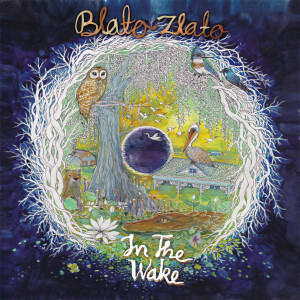 I went to a good number of musical events in 2019, and one of the most enjoyable was a performance and dance put on by the New Orleans-based Balkan band Blato Zlato. They’re a superb folk ensemble playing mostly Bulgarian-style music, its three female vocalists singing hair-raising close harmonies to the accompaniment of fiddle, accordion, upright bass and drum.
I went to a good number of musical events in 2019, and one of the most enjoyable was a performance and dance put on by the New Orleans-based Balkan band Blato Zlato. They’re a superb folk ensemble playing mostly Bulgarian-style music, its three female vocalists singing hair-raising close harmonies to the accompaniment of fiddle, accordion, upright bass and drum.
Those vocalists are Annalisa Kelly, Ruby Ross and Lou Carrig, who also plays accordion. They’re accompanied by Ian Cook on fiddle, Boyanna Trayanova on the tupan drum, and Janie Cowan on bass.
Much of the music played that night was from their debut 2017 album Swamp Gold but the music also drew on a good sampling from this new release, their second full-length In The Wake. The album features nine original songs, modern interpretations of Balkan folk traditions with a slight twist or two that comes from their home base of New Orleans. In The Wake is a concept album of sorts, examining from various angles the Crescent City’s relationship with nature – land, water and swamp.
“After two years of touring, performing, and composing together across a wide variety of environments and continents, we’ve written and arranged a batch of new songs that delve into themes of nature, water, and the fragility of life,” says accordionist and vocalist Carrig. “Many of our original songs center around our experiences here in New Orleans: we live below sea level with water all around us, and it’s not hard to find the poetry in the intense intermittent storms and sunshine one finds here. And we find ourselves frequently writing about immigration, and home: we write about how our hearts often feel split between New Orleans and Bulgaria, America and Europe.”
The opening track and first single “Vodata Teche” (“The Water Flows”) is an original song about climate change and the omnipresence of water in and around New Orleans. It opens with a spooky gumbo of sound made by voices and instruments with some white noise that could represent the ocean, then leaps with a crash into a mesmerizing song in 7/8 time, a common signature in Balkan dance music. It’s a long song at more than six minutes, ending with a section of three-part harmony accompanied only by the droning arco bass.
The album contains plenty of variety within the Balkan folk framework. A common structure for the songs is an a capella intro, or voices accompanied only by one instrument, usually a drone, then breaking into an uptempo dance. On “Pusta Mladost” the three vocalists sing unaccompanied at first, two voices providing a unison drone and the third singing the melody; then the two accompanying singers break into harmony on the second verse, to great effect. Eventually the rest of the band enters for another dance tune in 7/8. It’s a dark minor-key song, the fiddle and accordion alternately droning and running up and down the melody, the drums an insistent and martial tattoo. “Oblache Cherno” has a lengthy slow introduction that sounds like a supplication to the weather gods, accompanied by the portentous rumbling of the drum, threatening thunder in the near distance, before switching to a quick dance in five beats that somehow is hardly less unsettling. “Asha Chela” throughout is a stately march, the vocals set in low register accompanied by Cowan’s droning arco bass. Fiddler Cook really gets to stretch out on the joyous dance medley “Gaidine Sviryat/Karaj Majcho.”
One of the most popular numbers at that Portland dance in June was the uptempo “Shto Imala K’smet Stamena,” which appears here. It’s a fast dance in eight beats, the fiddle and accordion playing impressively in unison, and was a perfect piece to end the night on. Here it’s the penultimate track, its clamactic beat giving way to the melancholy denoument of “Kanjat Me Mamo,” (which an online translator renders as “My mom is invited”), with a lengthy accordion intro and what sounds to me like mournful lyrics sung in equally mournful harmony over the squeezebox’s continued drone. That’s it, just accordion and three voices in eerie harmony, and it’s a perfectly portentous end to this inspired and inspiring album.
Anyone who enjoys international folk and dance music, and definitely everyone who loves Bulgarian and other Balkan music, should hop on the Blato Zlato bandwagon. They’re making highly enjoyable music that applies ancient traditions to the present world situation, and even if you don’t understand the words, you’ll get “all the feels” as they say.
(self-released, 2019)
